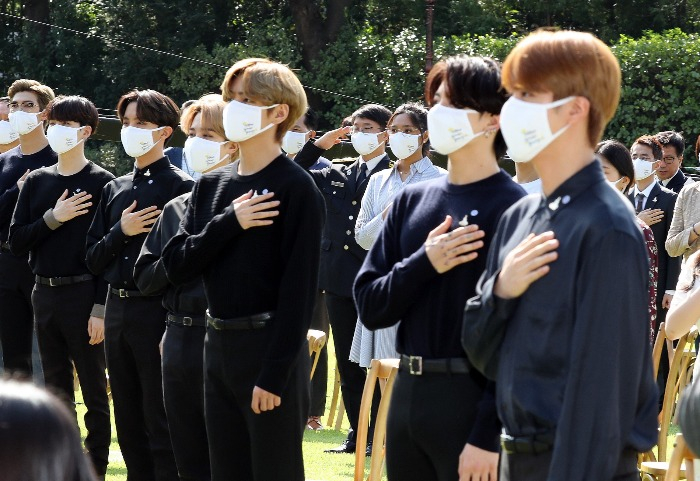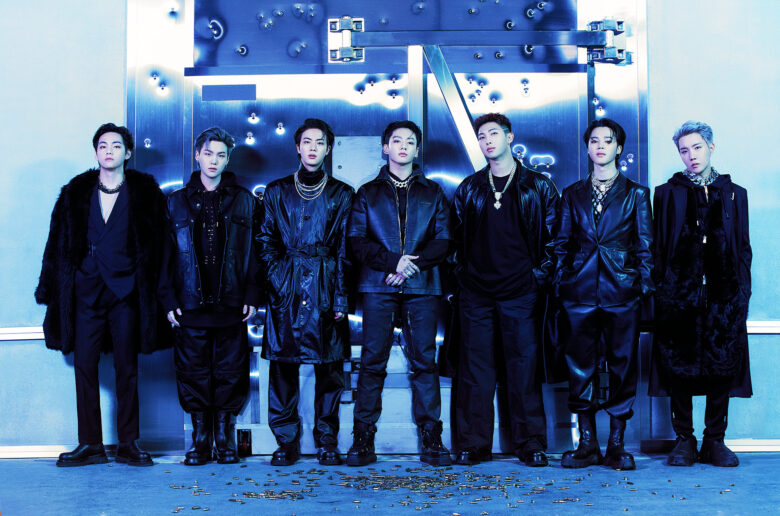The debate over the military service of the members of the world-famous Korean idol group BTS has been raging for two years and has yet to reach a conclusion. The deadline for the oldest member, Jin, to enlist in the military is approaching at the end of this year, so why is the government still unable to make its stance clear?
- Why is it that the government has been unable to clarify its position on the issue?
- There is a “BTS military service scenario.
- There have been new developments recently regarding military service for BTS.
- ■ Including popular performing arts in the field of sports and arts?
- ■ Obligations Imposed on “All Men
- What does conscription in South Korea look like?
- ■More than 80% say they wished they had avoided military service
- Unforgivable “draft evasion
- The label “evading military service = unpatriotic
- ■BTS has not appealed the application of the special exception system.
Why is it that the government has been unable to clarify its position on the issue?

There is a “BTS military service scenario.
Starting with Jin (29 years old), who will turn 30 years old as early as this year, the members will gradually enlist, and around 2028, the youngest member, Jong-Guk (24 years old), will enlist. Even if Jin returns in 2024 after completing his military service, all the members will not be able to work together again until 2030, when Jong-Guk finishes his military service. For an idol group to remain without some of its members for eight years is a terrible prospect, and in the fast-changing world of K-pop, there are concerns that fans will leave the group.
It is only natural that there are calls for a “special exception for BTS military service” not only from within Korea but also from around the world, asking for an environment in which BTS can continue their activities without having to enlist in the military. Despite this, the government’s reluctance to make such a special exception is due to fear of the “inequality” created by conscription and public anger.
There have been new developments recently regarding military service for BTS.
On the first of this month, South Korean Defense Minister Lee Jong-seop proposed “a method that can be resolved within the scope that does not violate the principles of fairness and impartiality” regarding B T Ss’ military service in a defense speech to the National Assembly. Defense Minister Lee said, “We have determined that there are any number of ways that can be done if there are overseas performances even after enlistment. From the perspective of the national interest, I think there are ways to give (BTS) the opportunity to continue performing.
However, this statement was based on the assumption that B T S members would be enlisted, meaning that Jin’s enlistment, which is coming up at the end of this year, is inevitable. Furthermore, this statement could be taken as a statement of the Ministry of National Defense’s negative position on the establishment of a new special system for military service that exempts from the draft those who have made achievements in the field of “popular entertainment” such as B T S.
The revision of the law concerning military service in the B T S is being discussed in two phases. The first stage is to amend the law to add the field of popular entertainment to the system of deferring enlistment until the age of 30. The popular performing arts field was previously exempt from the special exception, but in December 2020, the law was amended to add personnel in the popular performing arts field to the existing excellent personnel in sports and arts, allowing those who have been recommended by the minister in charge and those who have received orders from the government to defer enlistment until age 30. The so-called “B T S Enlistment Postponement Bill” was passed.
This amendment to the law made it possible for B T S who had received the 2018 “Order of Culture” to be eligible, and Jin was able to postpone his enlistment until this year, when he would turn 30 years old.
■ Including popular performing arts in the field of sports and arts?
The second step is to amend the law to include popular performing arts in the “alternative service system for physical education and the arts,” which effectively exempts them from the draft. Under this system, athletes who have won Olympic bronze medals or more or Asian Games gold medals (in the field of physical education) and those who have won second place or more in 42 international competitions designated by the government (in the field of the arts) are free to continue their activities as long as they undergo four weeks of military training.
An amendment has been proposed to this as well, adding Grammy Award winners and those who have achieved the number one position on the Billboard charts. Currently, no one but BTS meets these conditions, and the bill is effectively being treated as a “BTS draft exemption bill.
However, when the bill was submitted to the Diet last June, there was a sharp increase in the number of people asking whether the bill was fair. Behind this is the persistent criticism that the “special exception system in the field of physical education and the arts” is an unequal system. In fact, as of 2021, only 125 Koreans have been exempted from the draft under the special exception system in the field of physical education and the arts, and the special exception system for military service is perceived by many Koreans as a system for a select few.
In a survey conducted by specifically naming B T S, about 35% of respondents answered that it is not fair to make them subject to the special exception system because of their popularity (about 34% of respondents answered that it is fair), and it cannot be said that the draft exemption for B T S has gained public consent.
Under these circumstances, the head of the Military Affairs Agency, which is in charge of military service administration, was asked about the need for a special exception for B T S. He replied, “Military service is a problem common to all young people, not just B T S. I think it is very important for B T S to be exempt from military service. Whether or not it is fair in military service obligations is a very important criterion,” he replied, remaining cautious about the revision.
President Yun Suk-yeol also commented in July on the B T S’s special exception for military service, saying, “Rather than the president’s view, we should consider how the public views the issue, the public’s thoughts and public opinion, and proceed in accordance with the law. If the people think it is necessary, the National Assembly can amend the related bills,” but he avoided expressing his opinion as president.
From these statements, it does not appear that either the government or the National Assembly is actively taking up the cause for the B T S military service exception. Behind this is the political fear that the B T S military service exception will unexpectedly lead to a sense of “inequality” and cause a public outcry.
■ Obligations Imposed on “All Men
Conscription in South Korea began in earnest in 1951, during the Korean War. It continues to this day, with changes in the form, including the duration and scope of the draft. Unless the security environment, which is divided between North and South Korea, changes dramatically, conscription will probably be maintained in the future. There are several countries other than South Korea that have conscription, but South Korea’s conscription system is the most severe of them all.
What does conscription in South Korea look like?
Korea’s Constitution clearly states the “duty of national defense,” and all men over the age of 18 are obligated to serve in the military. Although all citizens are obligated to defend the nation, the duty of military service is only for men. From the male perspective, it is an “unequal obligation.
At the age of 18, a man is incorporated into the government as a military resource, and at the age of 19, he suddenly receives a “notification of military service evaluation and inspection” from the government agency in charge of military service administration. The government agency in charge of military service administration will check whether you are physically fit enough to enlist in the military. Please take the examination at the designated place.
The “Military Service Judgment Examination” classifies men from Level 1 to Level 7, of which Levels 1 to 3 are those eligible for active enlistment in the military.
Even if classified as eligible for active enlistment, it is not necessary to enlist immediately. Although it is possible to decide when to enlist, there is an age limit. For example, if you are a graduate student, you can postpone your enlistment until the age of 28 (or until the age of 30 under special circumstances such as health conditions).
As mentioned above, in addition to talented individuals in sports, those in the field of popular entertainment such as B T S can also postpone their enlistment until age 30 if they meet certain conditions, such as receiving a recommendation.
Enlistees may decide which service they will enlist in: the Army, Air Force, Navy, or Marine Corps. The Army has the shortest service period at 18 months. The Air Force is the longest at 21 months. The highest salary received for serving in the military is about $500 per month. Once drafted, they are assigned to a military unit and live as a group.
They can return to their parents’ homes only about 10 days a year, and military life involves isolation from society. Access to the outside world is restricted, making it difficult for them to keep up with the latest information and changes in the world, and they become “outdated. They rarely use the relationships and expertise they have built up to that point.
■More than 80% say they wished they had avoided military service
Those who have experienced military service say that “the military was harsh and hard. “According to a 2019 survey of 1,117 men who have completed military service conducted by the Korea Women’s Policy Institute, 80.8% said that they would have avoided going to the military if there was a way. Many men also said of their own military experience that “I lost a lot in the service,” “It was a waste of time,” and “The pay was too low. Conscription is a costly system for young men.
Furthermore, conscription, which has continued for more than 70 years, has gone beyond mere institutional meaning and functions as a “rite of passage. In Korea, there is a belief that men are “reborn” through conscription. There is a widely shared perception that “a man who has completed his military service is a mature, reliable, manly, and socially responsible man.
Conscription is a “rite of passage” to become a “true man,” and men who complete the draft become socially accepted as “adults. If they are found to have escaped in an unjust manner, they are treated as “unpatriotic.
In South Korea, where the college enrollment rate is high (about 80%), many men take a leave of absence from college to enlist in the military. After completing their military service, they return to college and study hard to find a job or pursue higher education. This is the typical lifestyle of male students. While men lose a little more than two years due to conscription, women are able to enter society one step earlier than men. Because of this, men perceive that conscription is unequal.
Unforgivable “draft evasion
The obligation of military service imposed only on men is a symbol of an unequal system for men. Furthermore, the frequent occurrence of “draft evasion” by the privileged class spreads a sense of inequality throughout society.
There are three injustices prevalent among the privileged in Korea. They are “fraudulent university admissions,” “fraudulent recruitment,” and “fraudulent military service. Military service fraud by the privileged, who use connections and money to avoid draft exemptions and enlistment, continues unabated, and military service is considered one of economic inequality.
For example, draft evasion was organized in the 1990s, and brokers existed to help people evade the draft. Through brokers, there were many cases of people evading military service by abusing methods that were only available to the wealthy, such as living abroad or studying abroad, and the expression “sons of God and sons of generals” appeared at the time to ridicule this disparity in society.
Sons of God” refers to the sons of the privileged class who evaded conscription by unfair means. A general’s son is someone who enlisted but was placed in a unit that took advantage of his connections and took charge of a cushy mission. To the extent that such terms were coined, conscription became a symbol of social inequality.
According to data submitted to the National Assembly by the Military Service Agency in 2016, 4.4% of the sons of high-ranking civil servants (e.g., prosecutors) were exempt from imprisonment. This figure is 16.9 times higher than the draft exemption rate of 0.26% for ordinary men (over the last five years). The draft has lost the trust of society.
Even today, there are many politicians and bureaucrats whose sons or daughters are suspected of evading the draft, and there is no end to the number of cases in which they have resigned because they could not withstand the intense public criticism. The perception of those who evade the draft is becoming increasingly severe.
The label “evading military service = unpatriotic
In 1997, a Korean-American man with permanent resident status in the U.S. made his debut as a singer in Japan. He produced numerous hit songs, and his dance moves were enthusiastically received by many fans. His polite demeanor and low profile earned him the nickname “beautiful young man. His name is Yoo Junjung.
He declared that he would renounce his permanent residence in the U.S. and fulfill his duty of national defense as a Korean man, and underwent a military service inspection. The scene was broadcast on television. Shortly thereafter, however, he returned to the U.S. and obtained U.S. citizenship. By acquiring citizenship, his “duty of national defense” ceased. Koreans expressed outrage at his actions. They perceived it as draft evasion.
The government responded to the public outrage against him. The South Korean government “banned” Liu Seung-Un from entering the country. The reason given was that he “has reasonable grounds for believing that he is likely to act in a manner detrimental to the interests of the Republic of Korea or to public safety. Those who evade conscription in Korea are treated as those who harm the interests and public safety of the Republic of Korea. Mr. Liu Seung-Syu filed a lawsuit against the South Korean government for denying him entry into the country, and in 2015, he won his case before the Supreme Court.
However, the South Korean government has not complied with the ruling and continues to deny him visa issuance and entry into the country. Mr. Liu Seung-Yuan has not been able to enter South Korea for the past 20 years. About 70% of the Korean public says that the refusal to allow him to enter Korea is justified. In addition to Mr. Liu, there are several other entertainers who are suspected of “draft dodging,” but his return to the entertainment industry has not been realized. The Korean people have not allowed him to return to the entertainment industry. For Koreans, “trying to evade the draft” is an unforgivable act.
Under these circumstances, adding Grammy Award winners and Billboard chart number ones to the special system for military service for B T S may spread the perception that the law is “unfair and unequal” for B T S. This is also the reason why the Diet has not taken an active role in the legal reform. The reason may be that the voices of “fairness” are turning into dissatisfaction with the draft, and they are afraid that the criticism will be directed at the political system.
Even if BTS members benefit from the “exception without consent system,” are exempted from the draft, and are able to continue their activities, they may be subjected to the negative image of being “idols who were exempted by special exception.
■BTS has not appealed the application of the special exception system.
On the other hand, BTS members have repeatedly made their position clear that they will fulfill their military service. This is because they are fully aware of the risks and effects of benefiting from the “exception without consent” system.
It is also true that there is criticism that the political use of military service for B T S should be stopped.
It is unclear whether a special military service bill for BTS will be enacted this year. Given the reality that conscription is deeply related to inequality and fairness in Korean society, the developments and policy decisions surrounding military service for BTS have become a troublesome issue that may cause new friction in Korean society.


コメント